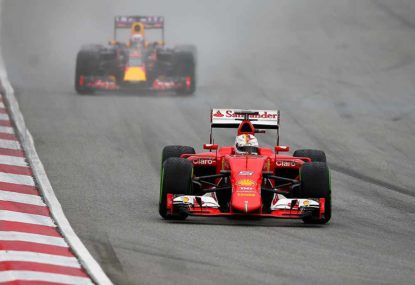Organisers of the Australian Grand Prix breathed a sigh of relief at the conclusion of Sunday’s race, which put a positive spin on what had become a weekend of dysfunction.
There’s no two ways about it: Saturday’s qualifying was a disaster.
Not only was it boring for anyone who happened to be watching, it put on display Formula One at its very worst – non-communicative, incoherent, and unstable.
It started positively, but by Q3 – traditionally the climax of Saturday, with the top ten cars trying to time their laps for the last possible second to take advantage of an improving track – the plan’s unravelling was obvious.
Six of the top eight drivers completed just one lap at the beginning of the session. Had Nico Rosberg not failed to put his car on the front row on that first run it’s likely Mercedes wouldn’t have opted to send its drivers out a second time.
The drivers were back in their garages with five minutes to spare – Lewis Hamilton could have waved the chequered flag for his own pole position.
The fight over the viability of the qualifying format has been going on for months, with the drivers in particular staunchly opposed, and they mobilised this weekend to make sure everyone knew they were united in their disappointment in not being consulted.
“I don’t see why everybody’s surprised now,” Sebastian Vettel said in the post-qualifying press conference, already changed into his team kit. “We all said what was going to happen. It happened.”
Fernando Alonso was bluntly unimpressed.
“This is nothing new – we spoke, and there were some meetings in Barcelona with the FIA etcetera with the drivers, but they do what they want,” he said resignedly.
A lack of consultation leading to imprecise and poorly reasoned decision-making has long characterised this sport, with its increasingly convoluted governance structure.
At the end of 2013 the sport’s regulatory process was upended. The sporting and technical working groups, which previously reported to the F1 commission, were usurped by the all-new F1 strategy group, which comprises just six of the biggest teams, along with the FIA and Bernie Ecclestone.
Only the strategy group can write suggested regulations. The F1 commission can only approve or reject them.
Formula One’s regulations are thus held hostage by a powerful group of parties embroiled in individual self-interest, with none bar perhaps the FIA able to legislate for the greater good.
Felipe Massa can testify as one of the seven drivers who attended a Pirelli-hosted rules summit in February, which unsurprisingly ended with little agreement.
“To be honest, it’s not nice feeling, because you see that many team principals, many people, are just thinking about the result in the end for them, for their team and for their interests,” he revealed.
“I think the drivers are [thinking like this] less… than how it is with the team principals, Bernie Ecclestone, Jean Todt, and everybody together. It’s not easy.
“Maybe this is something we need to try to improve in Formula One.”
But telling everyone to play nice and expecting a result would be a desperately naïve fix. Indeed, if the strategy group hasn’t got the message after all these years, this one qualifying mistake among a litany of missteps isn’t going to change the world.
“The problem is that the teams are involved a little bit too much,” Pat Symonds said when asked by this writer what Formula One has to do to get a real result – despite his Williams team sitting on the divisive group.
“You asked what Formula One should do; you should ask Formula One what they’re going to do. The teams aren’t the people to ask.”
Imagine any sporting code in the world that gives the power to only the wealthiest and strongest teams with the expectation they’ll govern for their smaller, more vulnerable competitors. Imagine the AFL giving the rulemaking power to Collingwood, or the NRL to the Broncos. The inevitable conclusion is a sporting dystopia.
“There are some teams that have a huge amount of money, and they want rules in a certain way. There are other teams that barely exist, and they want rules in a different way. The stronger ones win,” Symonds said.
“If you had someone who wasn’t batting for one team, you might get some better regulations out of them. If we had a solid direction, we as the teams would just follow.”
But the genie is already out of the bottle. Empowered with legislative authority no team is going to give up their advantage, despite almost all of them admitting it is poison for the sport.
Turkeys don’t vote for Christmas, and Formula One teams don’t vote for fairness. And as if Saturday’s farce wasn’t enough evidence or if you thought Sunday’s outburst of consensus for change showed a painfully slow learning curve, think again: one team is rumoured to have dissented to reverting from the new format.
The power politicking is far from over, and all the while our sport will be the loser.
Follow Michael on Twitter @MichaelLamonato





























































































